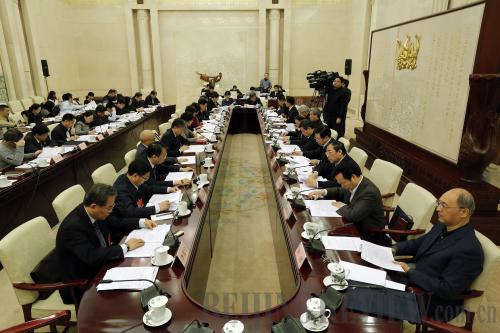|
 |
|
GIVING YOUR OPINIONS: The Law Committee of the 12th National People's Congress holds a meeting to deliberate on the draft revision to the Legislation Law in Beijing on March 11 (SHEN BOHAN) |
"It is not a simple change of a statute but shows that the central authority is delegating its power to those with a deeper understanding of the local dynamics," he said.
However, the bill also stirred up worry among other lawmakers.
South China's Guangdong Province, also a test ground for reform, is likely to see 17 more city legislatures given the power to make local laws.
"It could be a very good thing, but it could also be messy," said Wu Qing, an NPC deputy and veteran lawyer, at a panel discussion about the bill at the national legislative session this year.
Citing Dongguan in the province known for its booming export industry, Wu said local legislative power might help the city take a full advantage of a ministry-supervised pilot project on soil pollution treatment.
"If the city legislature can turn successful policies in the pilot project into a local law, these policies will become more permanent arrangements and benefit the city that has suffered serious soil pollution. Otherwise, it might take a very long time for a local pilot project to be incorporated into a national law," she said.
However, she also worried that not all cities are prepared for the new power.
Zhang Guifang, an NPC deputy and a senior lawmaker from Guangzhou legislature, noted that city laws may cover a wide range of topics and it is hard to draw a line between what is within their power and what is not.
Responding to the concerns, Zheng Shuna, Deputy Director of the Legislative Affairs Commission of the NPC Standing Committee, told a press conference on March 9 that the bill set up "five lines of defense" against possible abuse.
The bill only allows cities to issue local laws about "rural or urban development and management, environmental protection, and preservation of historical heritage and cultural values."
It also regulates that the power should be granted step by step and the provincial legislature will decide which city is suitable.
City laws, which should not contradict with national, provincial laws and Central Government regulations, must be approved by the provincial legislature.
As a last resort, the NPC Standing Committee will examine their legitimacy and make the necessary amendments.
Statutory taxation
Another provision that will affect every citizen's life is statutory taxation. The revised Legislation Law underlines the principle of statutory taxation by singling it out in a provision.
The revised law makes it clear that a tax can only be levied or canceled through the law and the basic system of taxation can only be decided through the law.
It is considered an attempt by the national legislature to change the current taxation arrangement.
Of China's 18 existing taxes, only three—individual income tax, corporate income tax, and vehicle and vessel tax—are levied through legislation, while the others are imposed through formal or provisional regulations issued by the State Council.
Such an arrangement was made because the NPC Standing Committee authorized the State Council to levy taxes about business activities in 1985. The decision was to give the cabinet more leeway in helping China shift from a planned economy to a market one. The cabinet has since instituted 15 taxes, consolidating the government's sources of revenue, as state investment plays a significant role in China's economic growth.
Fu Ying, spokeswoman for the Third Plenary Session of the 12th NPC, told a press conference on March 4 that China aims to realize full statutory taxation by 2020.
Fu explained that statutory taxation means that what taxes to be levied, to whom the taxes are collected and tax rates will all be decided by laws enacted by the top legislature.
"In the next few years, I believe we will have legislations on all 18 taxes. Any new tax, such as real estate tax and environment tax that are being mulled, should also be imposed by law," Liang said.
Explaining why the country needs complete statutory taxation now, Liang said empowering the legislature to impose tax can ensure a more transparent process and an independent stance from any interest groups.
It also makes it more rigid to adjust the taxes, which will increase the sense of stability for citizens and businesses, he said.
Statutory taxation was listed in the overall reform blueprint adopted by the CPC Central Committee at its key session in November 2013.
Limiting administrative power
Progress has also been made in the revised Legislation Law to rein in administrative power.
One provision bans ministries and local governments from issuing rules and policies that mitigate citizens' rights or increase their obligations without legal foundations.
| 